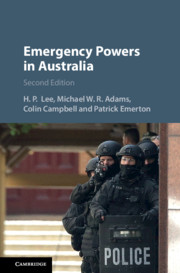Book contents
- Emergency Powers in Australia
- Emergency Powers in Australia
- Copyright page
- Contents
- Preface
- Notes on Authors
- Cases
- Statutes
- 1 Introduction
- 2 The Defence Power
- 3 The Executive, the Prerogative and Emergencies
- 4 Maintenance of Public Order
- 5 Public Safety and the War on Terror
- 6 Civil Emergencies and Special Powers Legislation
- 7 Military Aid to the Civil Power
- 8 The Judiciary and Emergency Powers
- 9 Conclusion
- Index
5 - Public Safety and the War on Terror
Published online by Cambridge University Press: 26 October 2018
- Emergency Powers in Australia
- Emergency Powers in Australia
- Copyright page
- Contents
- Preface
- Notes on Authors
- Cases
- Statutes
- 1 Introduction
- 2 The Defence Power
- 3 The Executive, the Prerogative and Emergencies
- 4 Maintenance of Public Order
- 5 Public Safety and the War on Terror
- 6 Civil Emergencies and Special Powers Legislation
- 7 Military Aid to the Civil Power
- 8 The Judiciary and Emergency Powers
- 9 Conclusion
- Index
Summary
- Type
- Chapter
- Information
- Emergency Powers in Australia , pp. 136 - 169Publisher: Cambridge University PressPrint publication year: 2018



